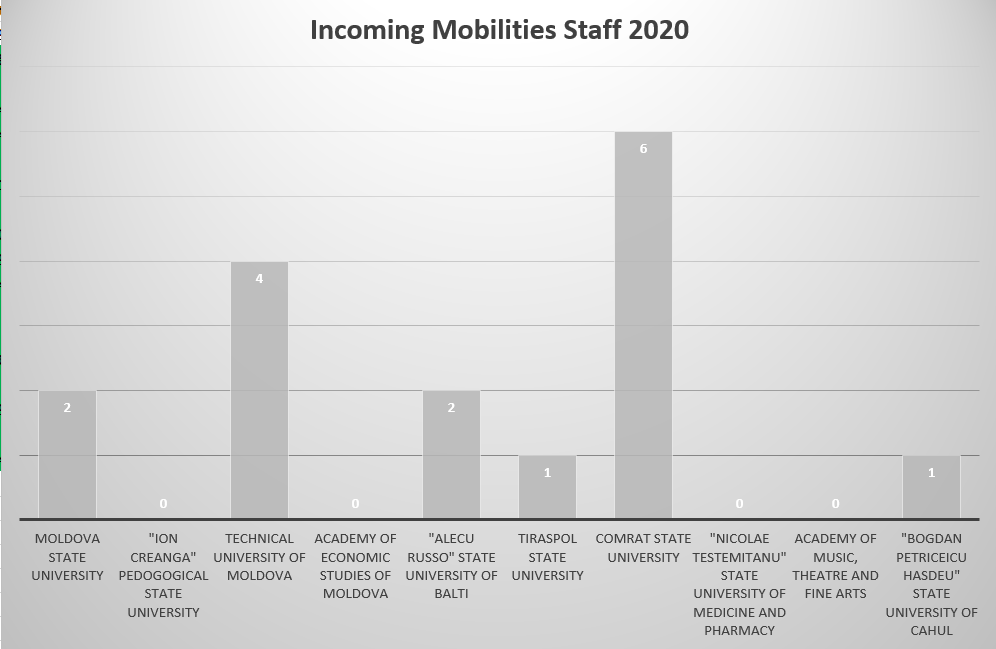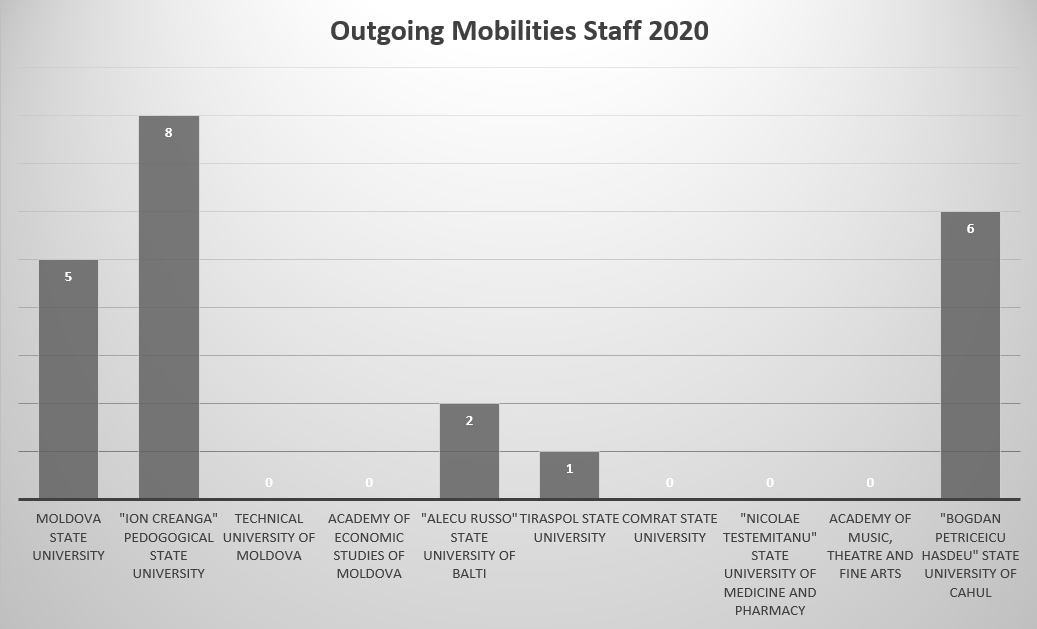

The Erasmus+, the leading European programme in education and training aims at supporting projects of mobility in higher education. . Erasmus+ KA107 - is an academic mobility programme between the universities located in the Programme countries, which include the EU member states, as well as the Republic of Macedonia, Iceland, Liechtenstein, Norway, Turkey, from 2019 Serbia and the Partner countries. Students can participate in the Erasmus+ in the form of following activities:
Student mobility can be in any subject area or academic discipline. The mobility activity has to be compatible with the student’s degree-related learning and personal development needs. The study period abroad must be part of the student’s study programme to complete a degree. Study periods can include traineeship periods. Wherever possible, the traineeships should be an integrated part of the student’s study programme.
The Erasmus Mundus Joint Master Degrees has been a component part of the Erasmus+ programme since 2014. In the Erasmus Mundus programme, students from any country in the world may apply for the Erasmus Mundus grant to study in one of the international shared study programmes developed and implemented by the consortium of European or even non-European universities. An EMJMD is a high-level integrated international study programme of 60, 90 or 120 ECTS credits, delivered by an international consortium of higher education institutions from different countries. The successful completion of the EMJMD Master programme leads to the award of either a joint degree or multiple degrees. The action also supports the award of scholarships to excellent students worldwide for their participation in EMJMD programmes.
Under the Erasmus+ Programme students who wand to complete a full study programme at Master level in another programme country can apply for a loan to contribute to their costs. Erasmus+ loans are a quite new scheme under the Erasmus+ Programme. Students who can apply must be a resident of one of the Erasmus+ programme countries, have successfully completed first cycle higher education studies and have been accepted for a second cycle programme.
The Central European Exchange Program for University Studies (CEEPUS) is an academic exchange programme for students and university teachers from Central Europe based on multilateral cooperation agreements in the fields of education and research.
The main CEEPUS activity is based on university networks operating joint programmes, ideally leading to joint degrees. In addition to the mobility inside the networks, CEEPUS also supports mobility outside CEEPUS networks, the so-called freemover mobility and short group mobilitries. Each CEEPUS country finances a certain number of scholarship months for the incoming mobility. CEEPUS covers mobility grants for students and teachers in this framework.
Under the CEEPUS programme, all mobility falls into one of four categories, given the category of grantee and the purpose of mobility:
The main objectives are focus on joint PhD programs and promoting cooperation in the framework of the EUSDR.
The CEEPUS Programme aims to enable higher education institutions of member countries to receive visiting professors, to exchange students, to organise language and professional courses, summer universities thus strengthening professional and personal relationships among Central European scholars empowering and developing Central Europe. The programme is based on the cooperation of higher education institutions in the member countries. The costs of the CEEPUS programme are paid by the governments of the host countries by covering the costs of living and the grants of CEEPUS grant holders. Within the framework of the programme, all members define quotas (scholarship months) in every academic year; that is, they declare the number of months for which they host foreign students and teachers.
Current member countries are Albania, Austria, Bosnia and Herzegovina, Bulgaria, Croatia, the Czech Republic, Hungary, North Macedonia, Moldova, Montenegro, Poland, Romania, Serbia, the Slovak Republic and Slovenia. Kosovo is also participating.
Bilateral programmes of mobility in higher education are scholarship programmes for citizens of Moldova and citizens from other countries based on international bilateral agreements and cooperation programmes with other countries.
Bilateral programmes include two types of scholarships:
Bilateral scholarships are awarded on the basis of public calls for credit or degree mobility, for a period of study or full-time study, post-doctoral or research stay, summer language courses or semester of Moldovan language learning for foreign students.
Due to the survey elaborated in ELEVATE project and the National benchmarks elaborated by the Ministry of Education, Culture and Research also in the frame of the ELEVATE project, there were colected a database with the information about the number of outgoing and incoming mobility of students. This alow to us to bring you an overview of the Moldovan HEIs’ level regarding the outgoing and incoming mobility of students for the period 2016 – 2020.
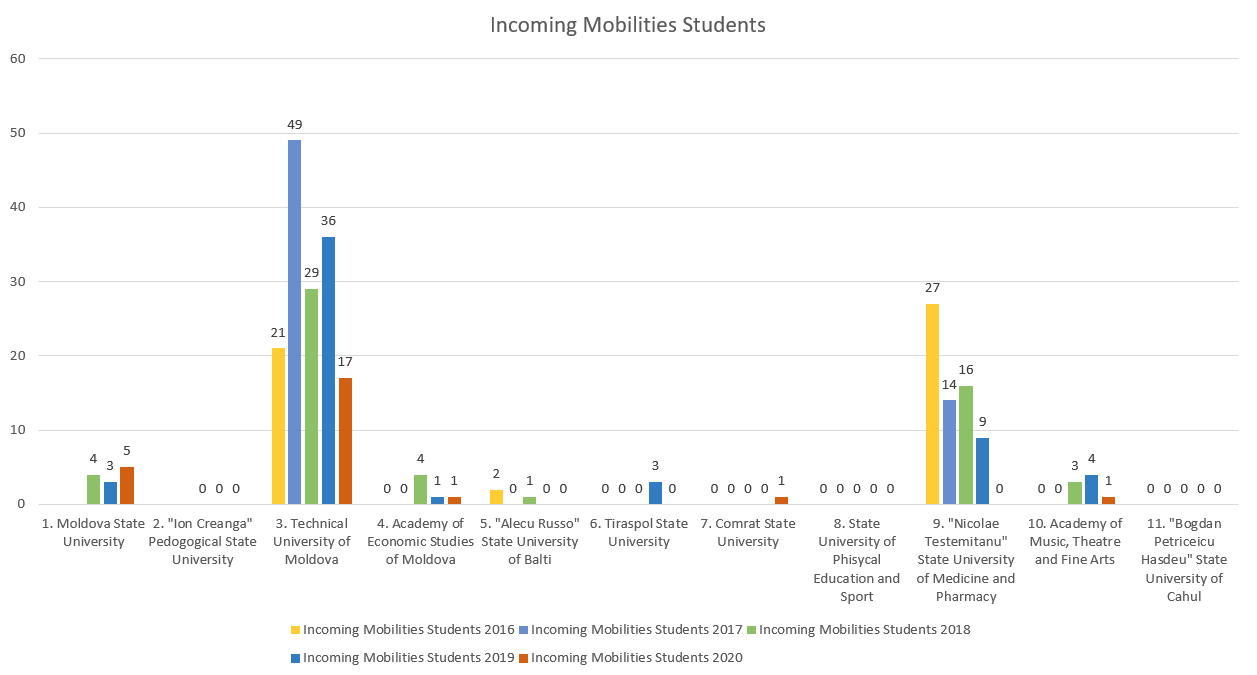
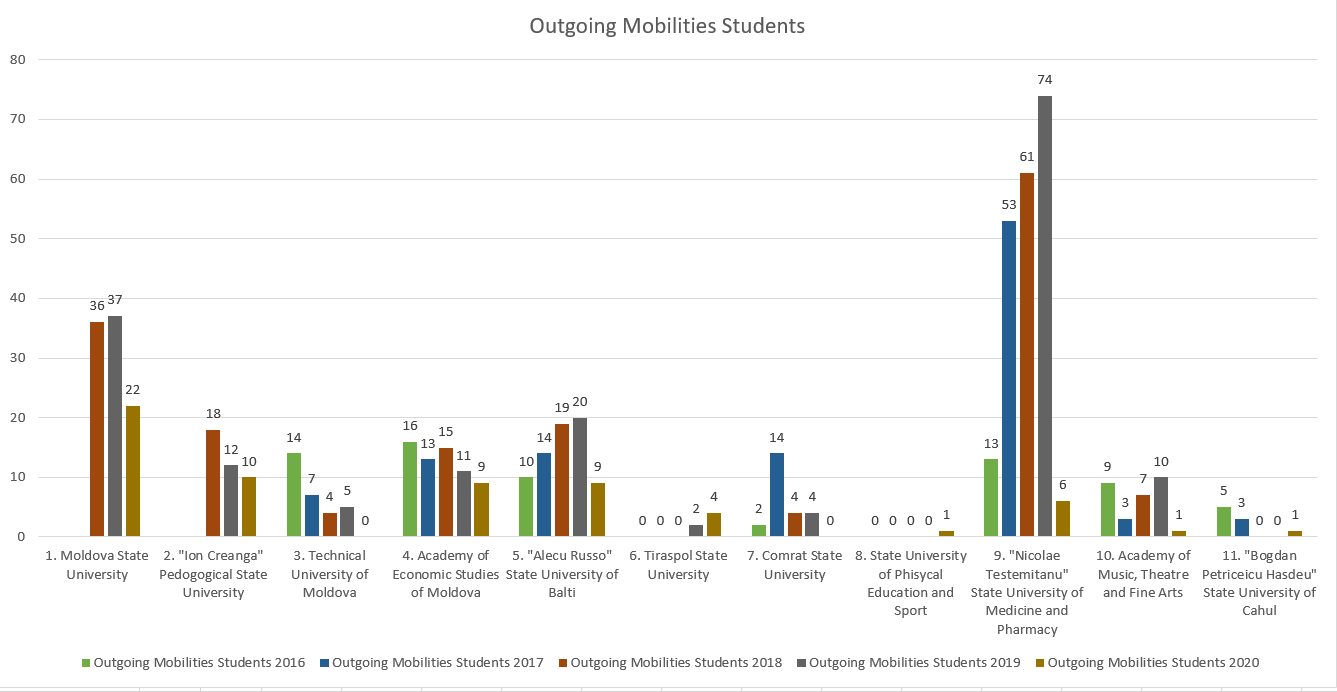
The next graphics presents the dates for the year 2020.
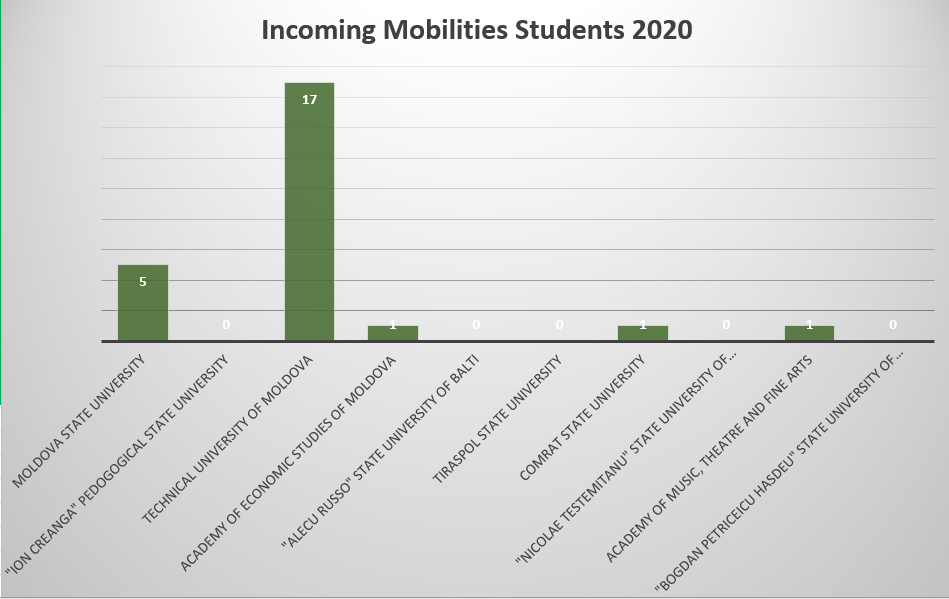
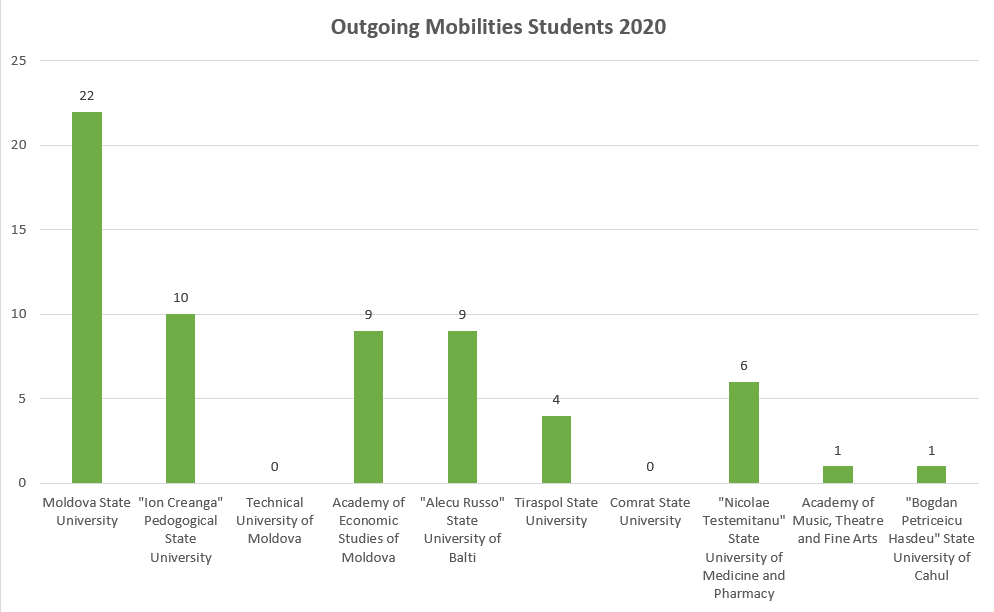
The Erasmus+, the leading European programme in education and training aims at supporting projects of mobility in higher education. Erasmus+ KA107 - is an academic mobility programme between the universities located in the Programme countries, which include the EU member states, as well as the Republic of Macedonia, Iceland, Liechtenstein, Norway, Turkey, from 2019 Serbia and the Partner countries. Most of outgoing and incoming mobilities in Moldova are funded through the Erasmus+ Programme.
Academic staff can participate in the Erasmus+ in the form of following activities:
Staff mobility for teaching can be in any subject area or academic discipline. Training periods can take the form of training events abroad and job shadowing/observation periods/training at a partner HEI or at another relevant organisation abroad. The mobility period abroad can combine teaching and training activities.
The Central European Exchange Program for University Studies (CEEPUS) is an academic exchange programme for students and university teachers from Central Europe based on multilateral cooperation agreements in the fields of education and research.
The main CEEPUS activity is based on university networks operating joint programmes, ideally leading to joint degrees. In addition to the mobility inside the networks, CEEPUS also supports mobility outside CEEPUS networks, the so-called freemover mobility and short group mobilities. Each CEEPUS country finances a certain number of scholarship months for the incoming mobility. CEEPUS covers mobility grants for students and teachers in this framework. See more information under Student mobility.
Bilateral programmes of mobility in higher education are scholarship programmes for citizens of the Republic of Moldova and citizens from other countries based on international bilateral agreements and cooperation programmes with other countries.
Bilateral programmes include outgoing scholarships (scholarships granted by partner countries to Moldovan citizens) and incoming scholarships (scholarships granted by the Republic of Moldova to citizens from other countries).
Bilateral scholarships are awarded on the basis of public calls for credit or degree mobility, for a period of study or full-time study, post-doctoral or research stay, summer language courses or semester of Moldovan language learning for foreign students.
Due to the survey elaborated in ELEVATE project and the National benchmarks elaborated by the Ministry of Education, Culture and Research also in the frame of the ELEVATE project, there were colected a database with the information about the number of outgoing and incoming mobility of staff. This alow to us to bring you an overview of the Moldovan HEIs’ level regarding the outgoing and incoming mobility of staff for the period 2016 – 2020.
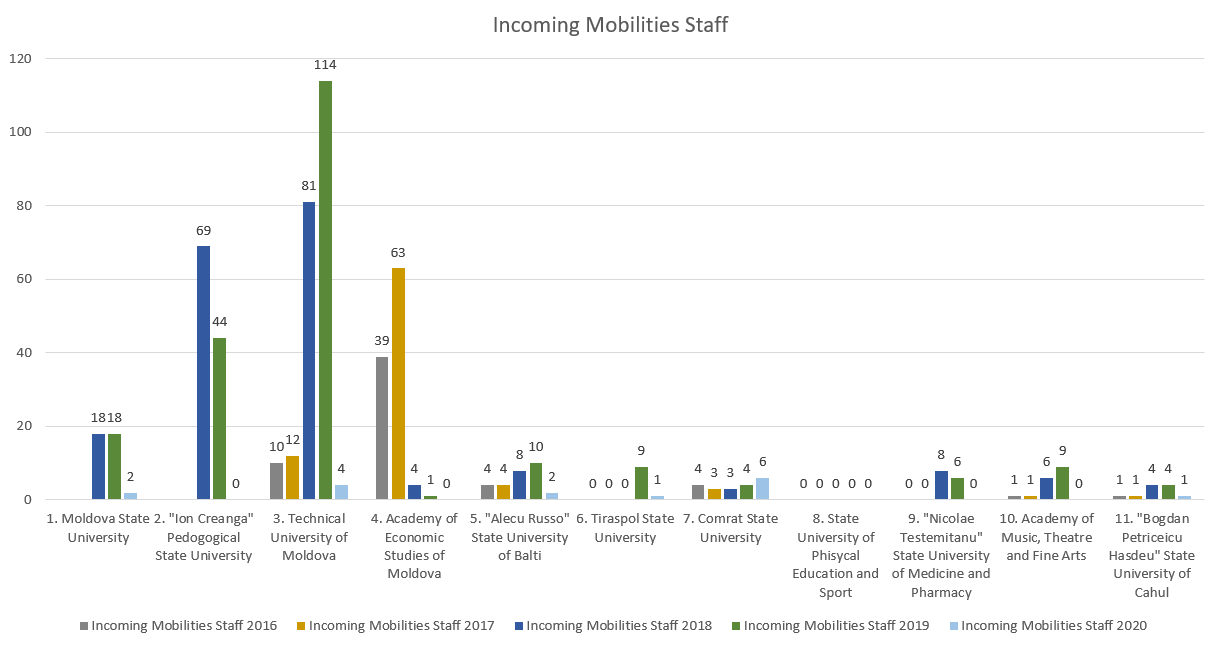
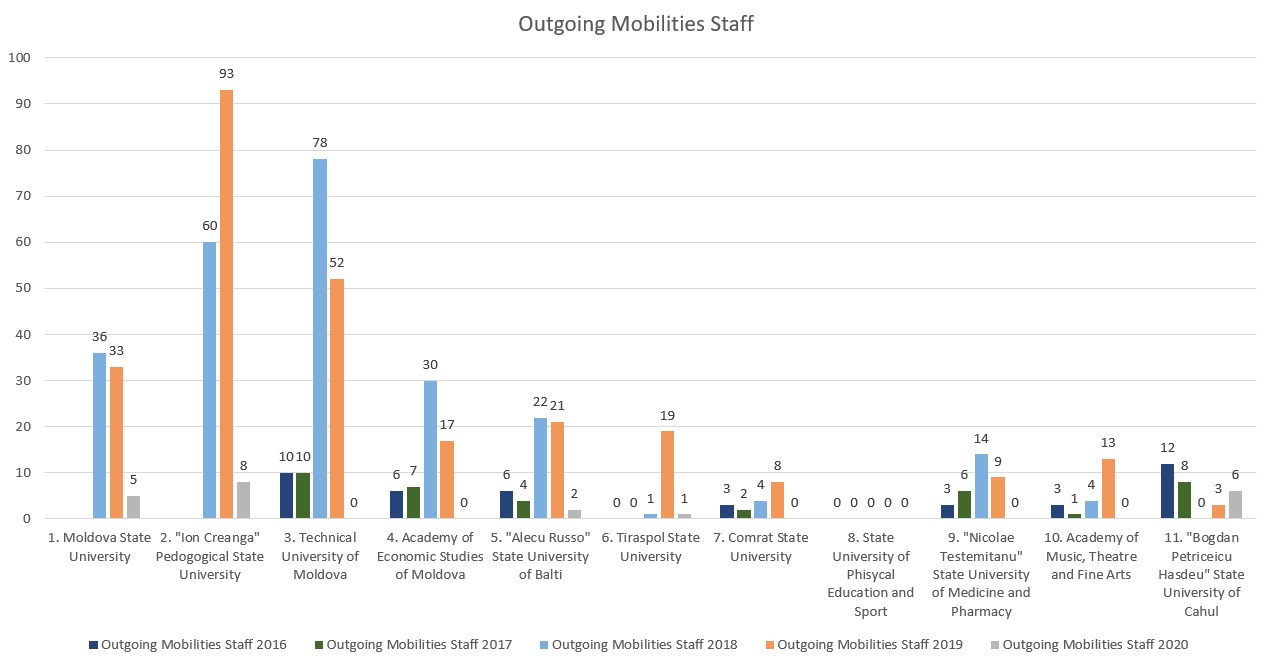
The next graphics presents the dates for the year 2020.
